Yes, “can dogs eat butternut squash” is a common question, and the answer is that butternut squash is on the ‘can eat’ list for dogs, offering health benefits when included in their meals. Learn how to prepare and serve butternut squash to avoid common pitfalls and maximize its nutritional advantages in response to the query, can dogs eat butternut squash. Stay tuned for helpful tips and creative serving suggestions.
Table of Contents
Key Takeaways
Butternut squash is a safe and nutritious food for dogs, containing vitamins and minerals like beta carotene, vitamin A, folate, and B6, which can boost the immune system and promote skin, eye, and digestive health.
The preparation of butternut squash for dogs is essential; cooked without seasonings makes it easier to digest and safer than raw. Skin and seeds should be removed to prevent choking or blockages.
Portion control is critical when feeding butternut squash to avoid overconsumption and potential vitamin A toxicity; for variety, other vegetables such as pumpkin and sweet potatoes are also dog-friendly options.
Butternut Squash: A Nutritious Snack for Dogs?
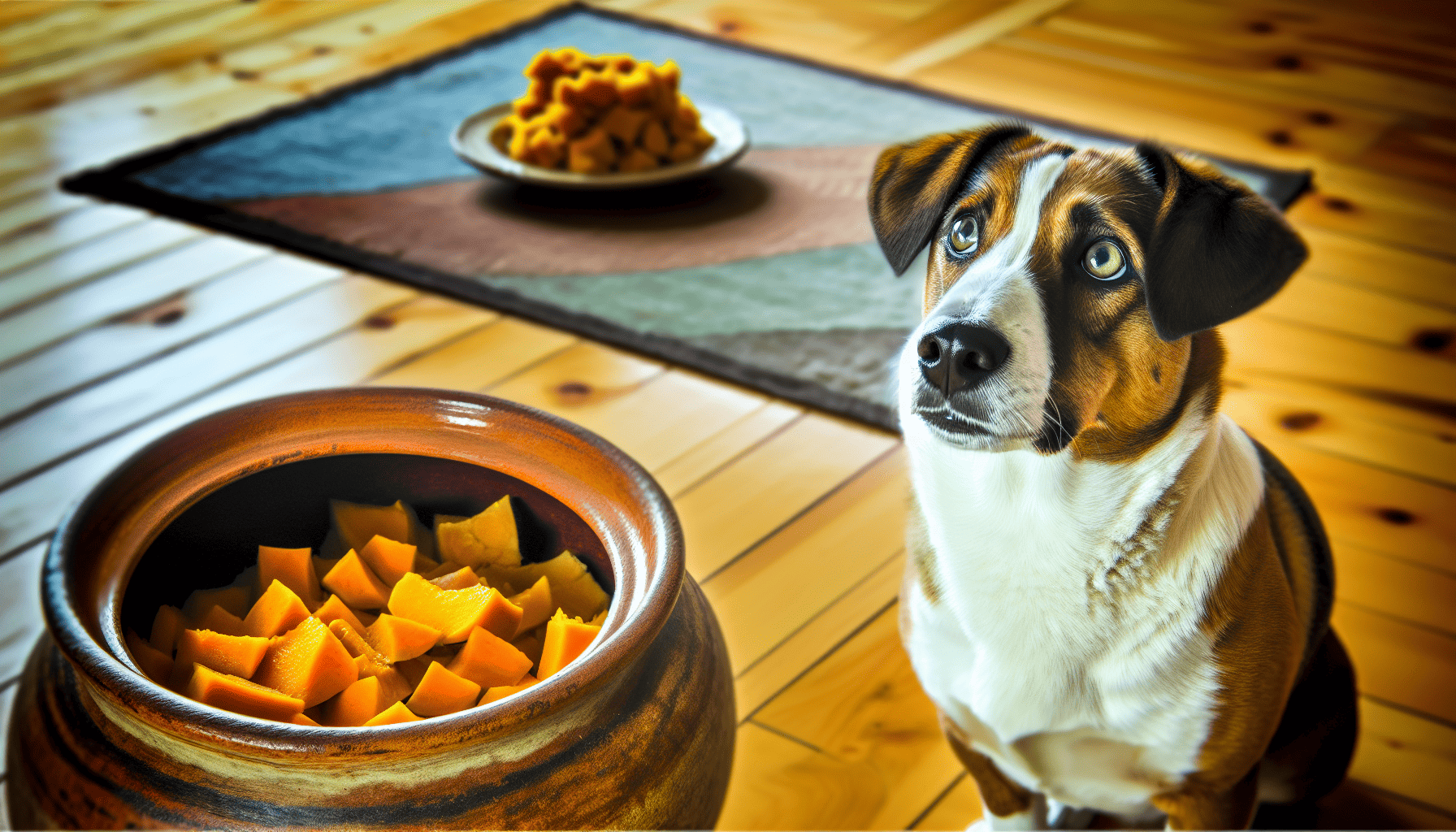
When you think about dog food, butternut squash might not be the first thing that comes to mind. But did you know that dogs eat butternut squash and that this humble vegetable is actually a powerhouse of nutrients that can do wonders for your dog’s health? Yes, you read that right! Dogs eat butternut squash, and it is not only safe for dogs to eat but also packed with essential vitamins and minerals that can boost your dog’s immune system.
However, as with any other food, it’s all about moderation. While this vegetable is incredibly nutritious, it should only make up a small portion of your dog’s diet to ensure a balanced nutritional intake. Next, we will explore the reasons for incorporating butternut squash into your dog’s meals.
Vitamins and Minerals in Butternut Squash
Butternut squash is a treasure trove of vitamins and minerals. It is a rich source of:
Beta carotene, which is converted to vitamin A in dogs, promoting healthy vision, immune function, and skin health
Folate that supports cellular growth and maintenance
Vitamin B6 which is crucial for energy metabolism and proper nervous system function
The nutritional benefits of butternut squash extend beyond this, and the same can be said for those who eat butternut squash, acorn squash, and spaghetti squash, but be cautious not to consume too much butternut squash.
More so, the Vitamin C in butternut squash acts as an antioxidant and supports collagen synthesis, contributing to a dog’s overall wellness. Indeed, integrating butternut squash into your dog’s meals can offer an array of health advantages, such as:
Boosting the immune system
Promoting healthy skin and coat
Supporting healthy digestion
Providing essential vitamins and minerals
And that’s not all!
Fiber Content and Digestion
Beyond its rich vitamin and mineral content, butternut squash is also a great source of dietary fiber. Fiber aids in digestion and supports a healthy digestive system for dogs. It helps regulate bowel movements and feed the good bacteria in a dog’s gut, contributing to a healthy digestive system.
What’s more, the fiber in butternut squash can provide several health benefits for dogs, including:
Reducing the risk of developing colon cancer by promoting a healthy digestive tract
Soaking up water and binding poop together, making it firmer and easier to move through the digestive tract
Helping to clear up diarrhea
These benefits not only improve your dog’s health but also provide ease of mind for you as a pet owner.
Preparing Butternut Squash for Your Dog
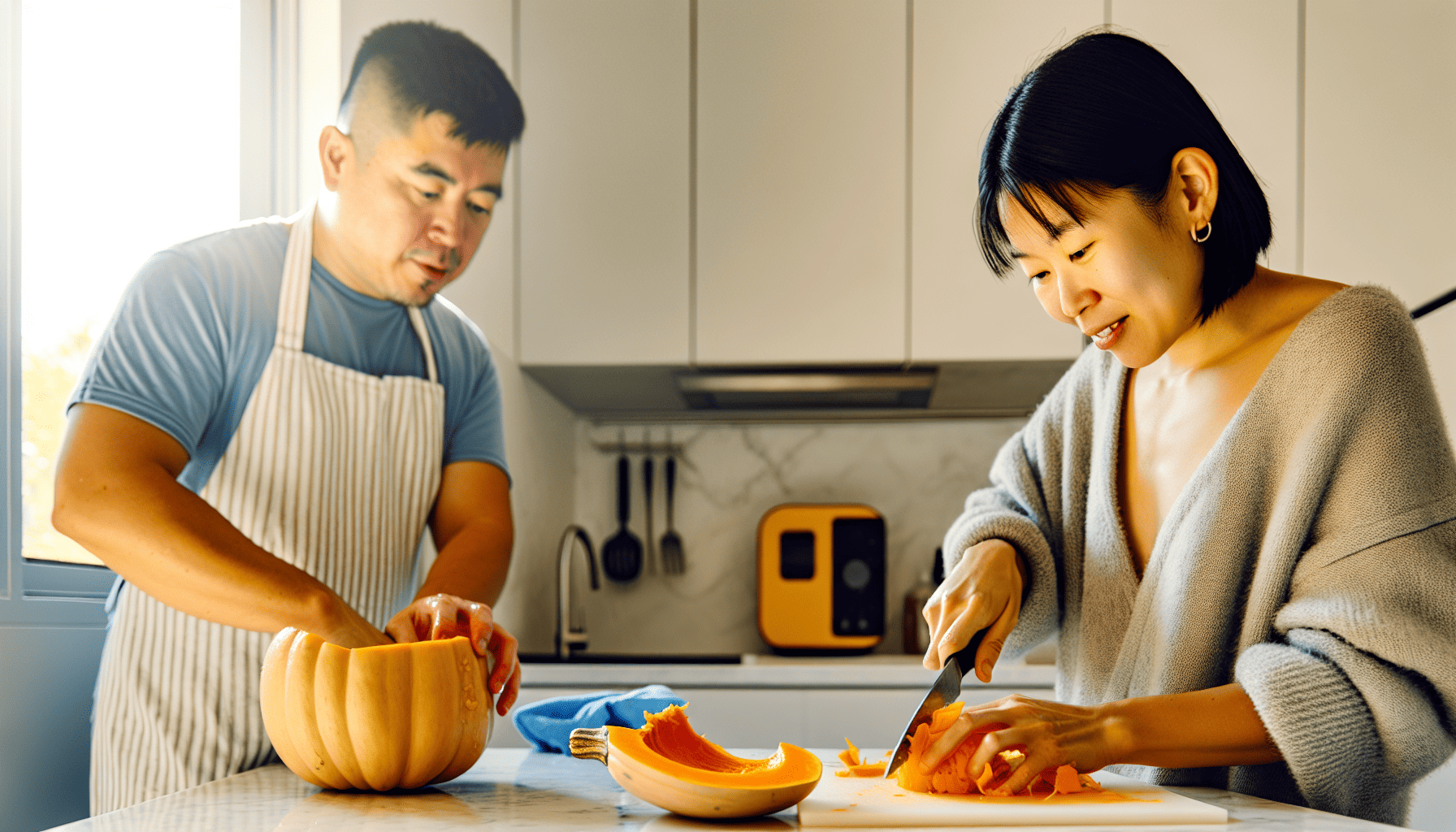
Having examined the nutritional value of butternut squash for dogs, let’s discuss its preparation. After all, a raw butternut squash isn’t exactly the most appetizing or easily digestible snack for your furry friend. But don’t fret, preparing butternut squash for your dog is simpler than you might think!
First things first, you need to wash the butternut squash thoroughly. Once cleaned, peel off the skin using a vegetable peeler, remove the seeds, and cut it into small bite-sized cubes. You can then cook the butternut squash by baking, roasting, boiling, steaming, or microwaving it plain. Roasting it at 400°F (200°C) for 25-30 minutes or steaming for 10-15 minutes are two recommended methods. After cooking, allow the squash to cool before serving it to your dog.
Raw vs. Cooked Butternut Squash
The question of whether to serve raw or cooked butternut squash to dogs is a valid one. While raw butternut squash is not toxic to dogs, it can be difficult for them to digest and could present a choking hazard. On the other hand, cooked butternut squash is tastier, easier to chew, and significantly easier for dogs to digest than its raw counterpart.
Thus, between raw squash and cooked butternut squash, the latter is undoubtedly the better choice for a delicious butternut squash soup. Just remember, when preparing cooked squash, it should be free of oils and seasonings, and toxic ingredients like onion and garlic must be strictly avoided.
Removing Seeds and Skin
You might wonder why it’s necessary to peel the skin and remove the seeds before feeding butternut squash to your dog. Well, the seeds and skin of butternut squash can create a choking hazard or cause blockages in the digestive tract of dogs if consumed in large amounts,.
So, before you get cooking, make sure to scoop out the guts and seeds and peel off the butternut squash skin. This simple step ensures that butternut squash is safe for your dog to eat and will go a long way in preventing any unwanted health scares.
Serving Suggestions: How to Incorporate Butternut Squash into Your Dog’s Diet
Understanding the nutritional advantages and preparation process of butternut squash for your dog is helpful, but how should it be included in your dog’s meals? Well, butternut squash can be used as an ingredient in homemade dog treats, offering a nutritious snack for dogs. You can also offer butternut squash in chunks as a tasty and healthy treat.
But don’t stop at treats! There are numerous creative ways to include butternut squash into your dog’s meals. We’ll explore some of those methods in the following sections.
Portion Control and Frequency
Even though butternut squash is a nutritious supplement to your dog’s diet, it’s pivotal to keep portion control in mind. So, how much butternut squash should you give your dog? Here are some general guidelines for serving sizes:
Toy dog: only about a teaspoon or two of butternut squash per day
Medium-sized dog: a tablespoon or two daily
Larger breeds: can have more, but exact amounts should be tailored to the individual dog’s size and dietary needs.
Butternut squash treats should not exceed 10% of your dog’s recommended daily calorie intake to maintain a balanced diet. For an overweight dog, it’s particularly vital to restrict butternut squash consumption to prevent additional weight gain.
Creative Recipe Ideas
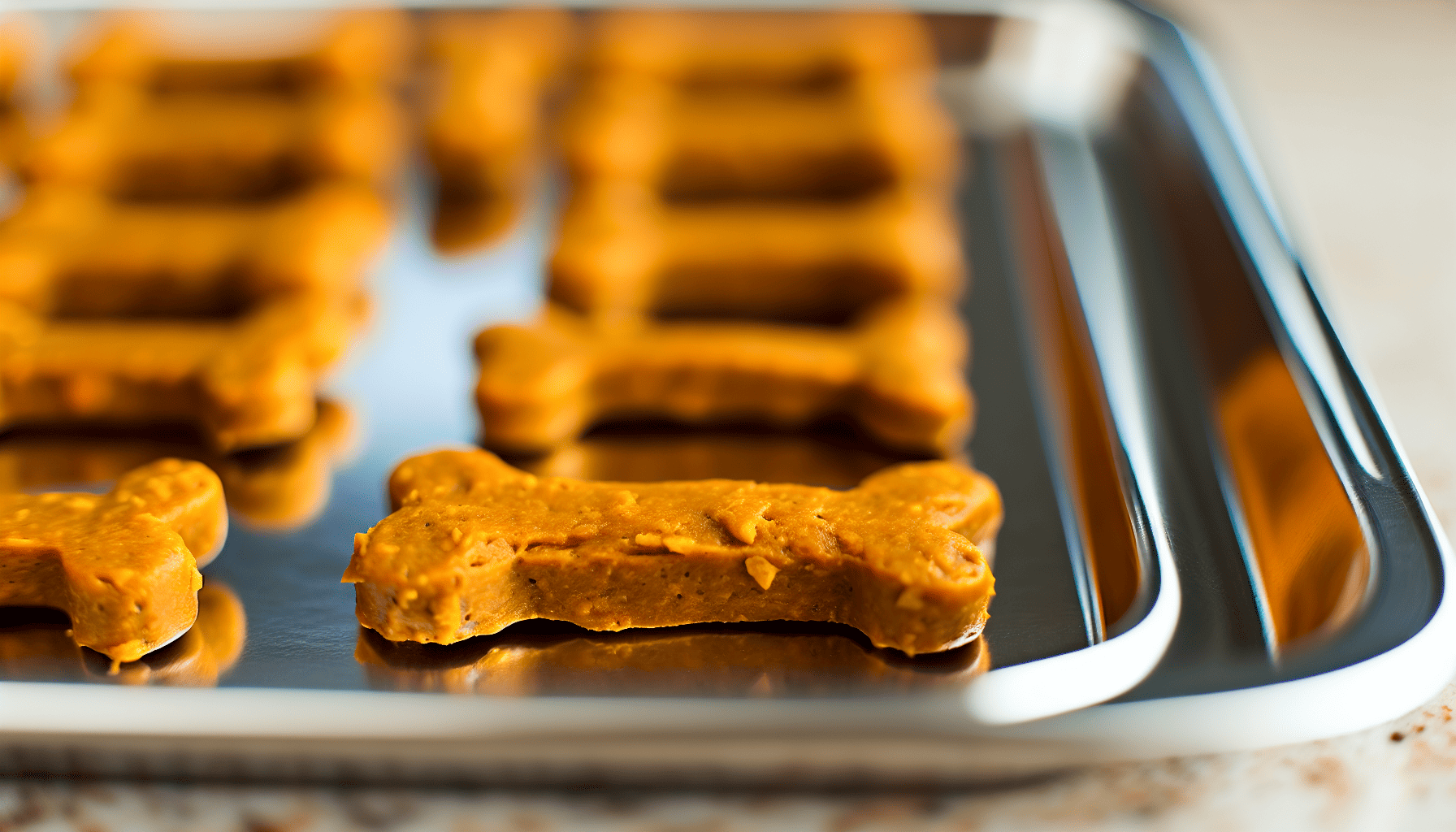
Ready to get creative in the kitchen? There are numerous ways to serve butternut squash to your dog. You can bake and blend butternut squash seeds into a fine powder to sprinkle as a nutritious food topper. Or, how about dehydrating butternut squash slices to create chewy, healthy treats that dogs will enjoy munching on?
The fun doesn’t stop there. You can fill a Kong with cooked and mashed butternut squash and freeze it to provide a cool, long-lasting treat. Or, mix mashed cooked butternut squash with a dog’s wet food for a nutritious homemade meal. With these creative ideas, your dog will never get bored of butternut squash!
Potential Risks and Precautions
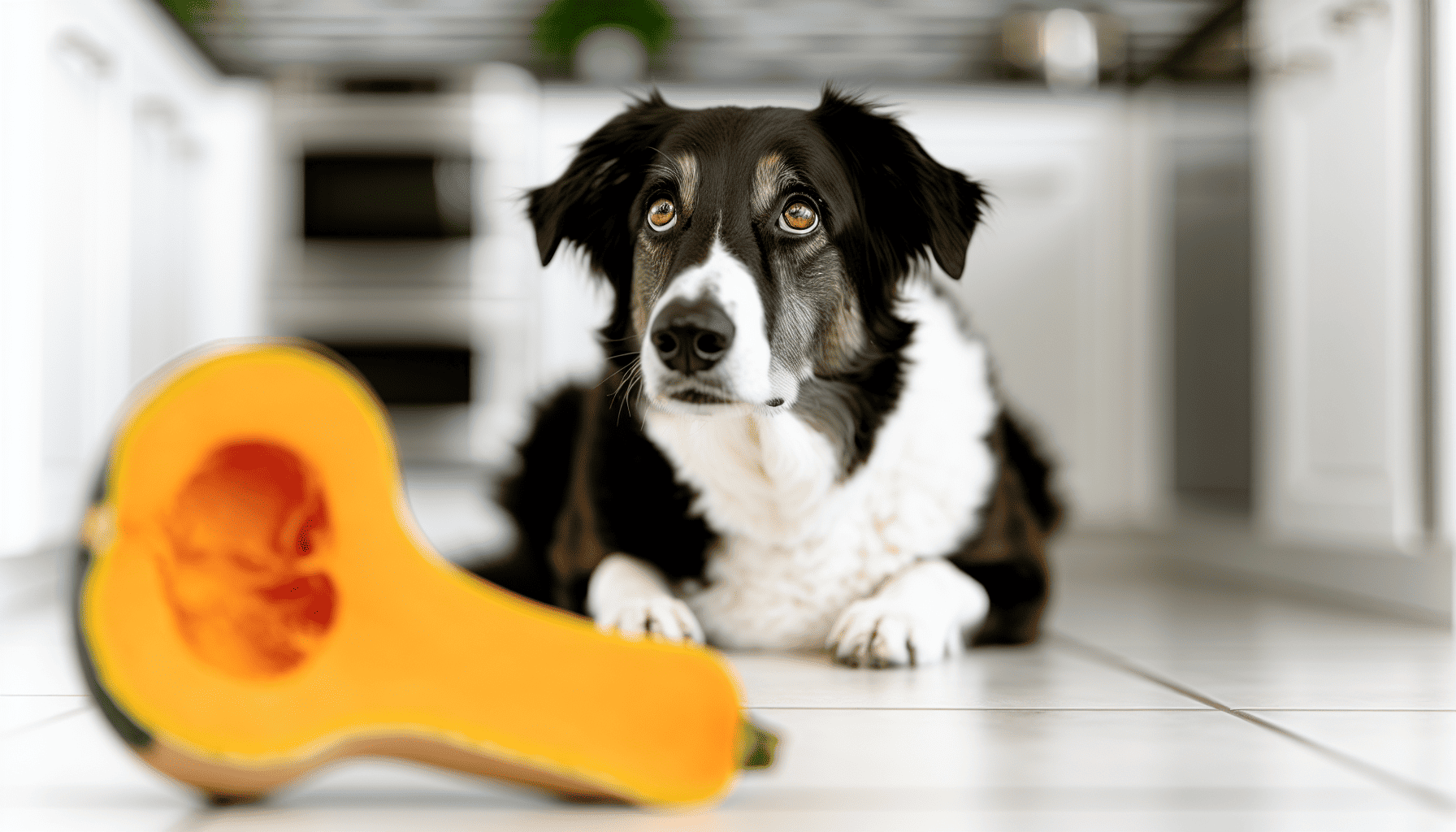
As with any food, feeding butternut squash to dogs comes with potential risks and precautions. While butternut squash is generally safe for dogs to eat, there are a few things to keep in mind:
Overconsumption can lead to vitamin A toxicity, which can harm your dog’s health.
Some dogs may have allergies or intolerance to butternut squash, so it’s important to monitor their reaction after eating it.
Choking can be a concern, especially if your dog tries to eat large chunks of butternut squash or if they exceed their daily calorie needs.
It’s always a good idea to consult with your veterinarian before introducing any new food into your dog’s diet.
Therefore, while butternut squash can be a healthful supplement to your dog’s meals, it’s important to keep an eye out for any negative reactions and modify their diet accordingly. Let’s further examine these potential hazards and precautions.
Allergies and Sensitivities
While uncommon, dogs can have adverse reactions to foods they eat, including butternut squash. It’s important to note, though, that these are usually due to food intolerances rather than allergies. Intolerances usually cause gastrointestinal disturbances rather than an immune system response when dogs eat such foods.
So, while butternut squash is not a common allergen for dogs, always introduce new foods into your dog’s diet gradually and watch out for any signs of discomfort or distress.
Overconsumption and Vitamin A Toxicity
There’s a well-known saying, “excess of anything is bad,” and this indeed applies when feeding butternut squash to your dog. Butternut squash is high in vitamin A, and excessive intake can lead to vitamin A toxicity in dogs.
Alongside this, the rich carbohydrate content of butternut squash can contribute to obesity in dogs if not properly managed. Moderation is key when introducing butternut squash into your dog’s diet to avoid any potential health risks.
Alternatives to Butternut Squash for Dogs
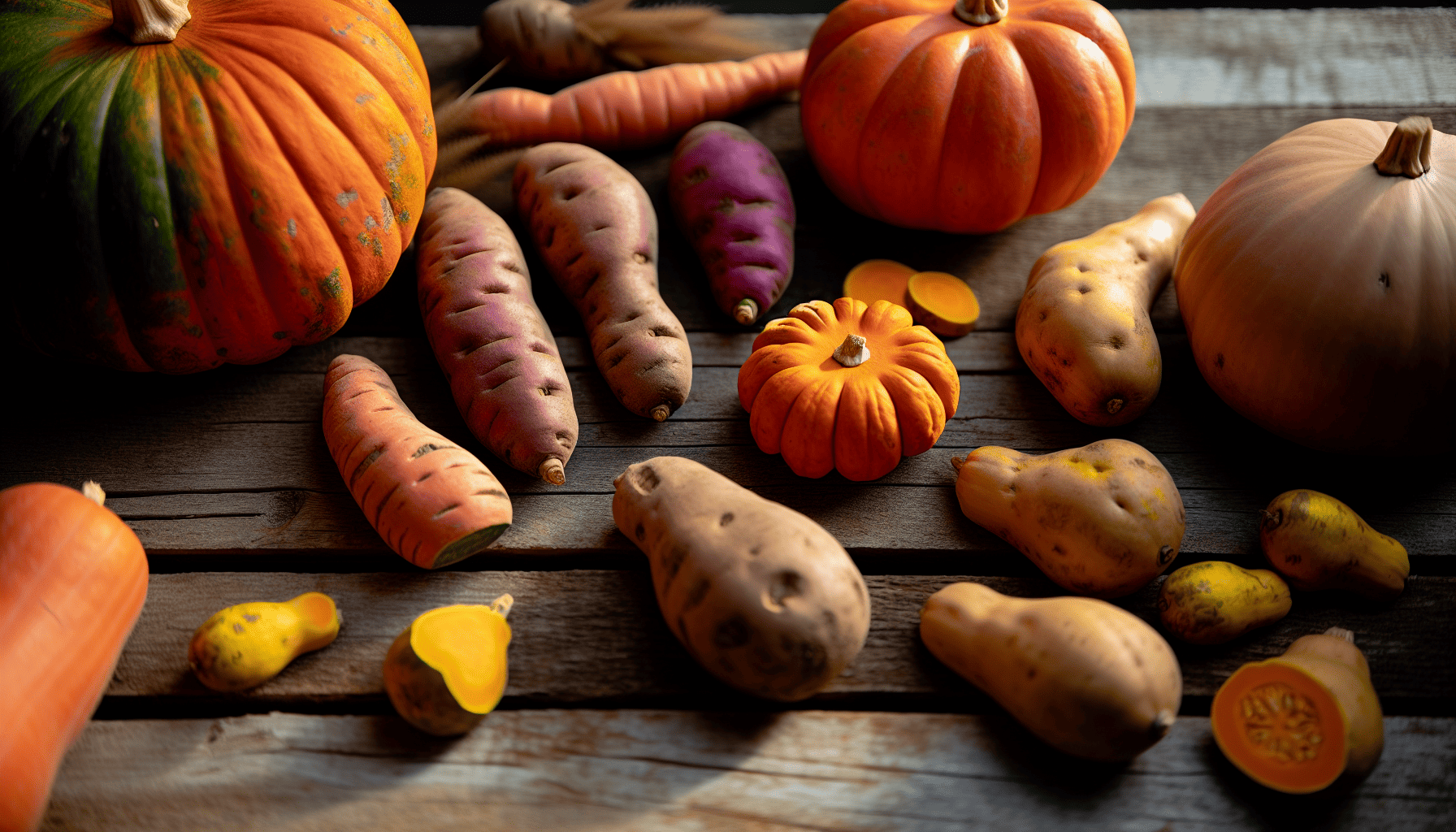
Even though butternut squash is a nutritious supplement to a dog’s meals, diversifying the vegetables is always beneficial. Other than butternut squash, there are many other nutritious vegetables that your dog might enjoy. And the best part? They all come with their own set of unique health benefits!
Pumpkin and sweet potatoes, for instance, are excellent alternatives to butternut squash that are also packed with vitamins and dietary fiber. Let’s delve into these alternatives and other dog-friendly vegetables in the subsequent sections.
Pumpkin and Sweet Potatoes
Pumpkin and sweet potatoes are not only delicious but also packed with vitamins and dietary fiber that can be beneficial to a dog’s overall health. They serve as excellent alternative sources of beta-carotene, vitamins, and minerals.
Just like with butternut squash, remember to introduce these vegetables into your dog’s diet gradually to avoid digestive upset. Also, when preparing these veggies, they should be cooked without added spices or sugars to ensure they are safe for dogs to consume.
Other Dog-Friendly Vegetables
The garden of dog-friendly vegetables doesn’t stop at butternut squash, pumpkin, and sweet potatoes. In fact, dogs eat squash of various types, providing them with a diverse range of nutrients. There’s a whole world of vegetables out there that your dog might enjoy! Including a variety of vegetables in your dog’s diet can contribute to overall health and wellbeing.
From beets to celery, spinach, cucumbers, zucchini, asparagus, Brussels sprouts, and kale, there are numerous options for you to explore. Each vegetable comes with its unique nutritional benefit, helping to maintain a balanced and healthful diet for your dog.
Summary
In conclusion, butternut squash is a nutritious addition to your dog’s diet. Packed with vitamins, minerals, and fiber, this vegetable can boost your dog’s immune system, promote healthy vision, and aid digestion. However, it is crucial to remember that portion control is key, and it’s always best to introduce new foods gradually to avoid any potential risks or adverse reactions.
Remember, variety is the spice of life, and this holds true for your dog’s diet as well. While butternut squash is a great choice, mixing it up with other dog-friendly vegetables like pumpkin, sweet potatoes, and others can provide your dog with a diverse range of nutrients, contributing to overall health and wellbeing. So, why not start exploring these options and give your furry friend the gift of a nutritious and diverse diet?
Frequently Asked Questions
Can dogs eat squash?
Yes, dogs can eat squash, but it is important to remove the seeds beforehand to prevent any potential digestive issues.
Is boiled butternut squash good for dogs?
Yes, boiled butternut squash is good for dogs as it provides essential vitamins and nutrients, contributes to a healthy immune system, and serves as a low-calorie and low-fat treat option for your pup.
How do you prepare butternut squash for dogs?
You can prepare butternut squash for dogs by roasting it in the oven until the skin is soft, then scooping out the flesh, mashing it with a fork or pureeing it, or cutting it into small pieces to feed as a healthy treat. This is a great way to provide your furry friend with a nutritious snack.
How much butternut squash can I give my dog?
You should only give a toy dog a teaspoon or two of butternut squash a day, a medium-sized dog can have a tablespoon or two, and a large breed can have even more. Additionally, ensure that the squash treats do not exceed 10% of your dog’s recommended daily calorie intake.
What are some potential risks of feeding butternut squash to dogs?
Feeding butternut squash to dogs can pose risks such as vitamin A toxicity and potential allergies. It’s important to introduce new foods slowly and watch for any negative reactions in your dog.




